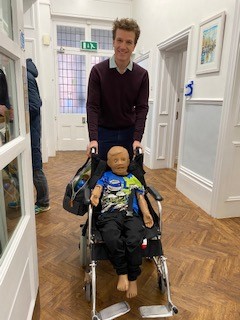What is Simulation Training?
Training Hub simulation activity so far
The Training Hub's offer
Simulation Training in Primary Care video
Feedback in BNSSG
Contact details and further information
More about simulation based education
What is Simulation Training?
Simulation training is an established educational tool in healthcare, and there are many benefits for primary care teams, with simulation-based education having shown numerous benefits for individuals, teams, and systems.
Simulation training allows people and teams to experience and observe challenging situations in a safe environment, to share experiences, and to learn from both peers and facilitators to improve the care that we can deliver to our patients. There has been growing interest in Primary Care Simulation to:
- Improve staff confidence and capabilities
- Contribute to team working and other non-technical skills
- Build awareness of other team members skills and strengths
- Highlights latent errors in systems and processes
- Increase staff morale and satisfaction in roles
Training Hub simulation activity so far
BNSSG Training Hub worked with local secondary care simulation centres over 2022 to train several ‘Simulation Ambassadors’. These Simulation Ambassadors are primary care clinicians with an interest in education who have had additional training in the theory and practice of simulation, to enable them to design and deliver simulation sessions to primary care staff and teams across BNSSG, co-ordinated and supported by a HEE funded Simulation Fellow.
Examples of simulation sessions that have been delivered include:
- Full day simulation sessions delivered in MDT settings covering 6 different scenarios with a focus on both paediatric and adult urgent and unscheduled care (Sept 2022)
- Single scenario simulation sessions delivered to practice teams in their own clinical environments (through 2022 and ongoing into 2023)
- Half day training sessions focused on managing difficult conversations for non-clinical staff (Oct 2022)
- Simulation courses designed and delivered for GP Doctors in Training
- ‘Duty Doctor’ sessions to prepare ST3s for managing such sessions independently post CCT (March / April 2023)
- Consultation based paediatric simulation session for GP STs with a focus on UUSC (Feb/March 2023)
- “Challenging consultations” session in conjunction with TPDs and using actors (Jan 2023)
- Safeguarding in primary care for ‘new to general practice nurses’ and GP STs in conjunction with Avon LMC’s ‘Legacy Nurses’
Topics that have been covered include:
- Team based management of an unwell / collapsed patient in a practice
- UUSC paediatric presentations (e.g. acute asthma, febrile child, non-accidental injury)
- Mental health presentations
- Shared decision making
- Adult and paediatric safeguarding scenarios
- Managing challenging conversations with patients (for both clinical and non-clinical staff groups)
- Managing the angry patient
Though there are many other topics that simulation lends itself to as an educational medium.
The Training Hub's offer
Out now – PCN in-practice simulation offer. We have been funded to offer one simulation session to each PCN in the BNSSG area. Please see this flyer for more information and how to request a simulation session in your PCN.
Over 2024 the Training Hub also plans to deliver a variety of simulation based educational sessions:
- Simulation educator ‘train-the-trainer’ course to build and develop the faculty available to deliver simulation sessions.
- We are exploring other areas that we can contribute to the learning and development of the BNSSG workforce.
We will be sending out more information on these different simulation offers through the BNSSG Training Hub newsletters and via PCNs, so please look out for these, though you are also welcome to e-mail us to find out how to be more involved in the program.
We will be sending out more information on these different simulation offers through the BNSSG Training Hub newsletters and via PCNs, so please look out for these, though you are also welcome to e-mail us to find out how to be more involved in the program.
Simulation Training in Primary Care video
Below is a video we have commissioned to outline the benefits of simulation training. If you wish to share the link, it is:
Feedback and participant comments in BNSSG
When asked, 99% of course participants would recommend the course they attended to a colleague.
Aggregate feedback for recent, locally delivered simulation sessions, using a 1 to 10 rating scale
| Session format | Overall rating of education session | Overall relevance of education session | Self-rated improvement in confidence | Self-rated improvement in ability | Number of atendees |
| In-situ simulations | 9.1 | 9.6 | 8.8 | 8.8 | 50+ participants in October 2022 |
| Simulation centre days | 9.3 | 9.2 | 8.3 | 9.2 | 19 attendees over 2 days in Sept 2022 |
Contact details and further information

More about simulation based education elsewhere
The simulation faculty are strong advocates for simulation based education in primary care and are working together with teams across the UK to develop primary care simulation and to ensure we are delivering the best possible quality simulation training locally.
HEE has produced a national simulation strategy – https://www.hee.nhs.uk/our-work/technology-enhanced-learning/simulation-immersive-technologies
New Primary Care Special Interest Group being formed within ASPiH – https://aspih.org.uk/
RCGP now host an on-line forum for primary care simulation educators (members only) – https://forum.rcgp.org.uk/c/simulation/35



